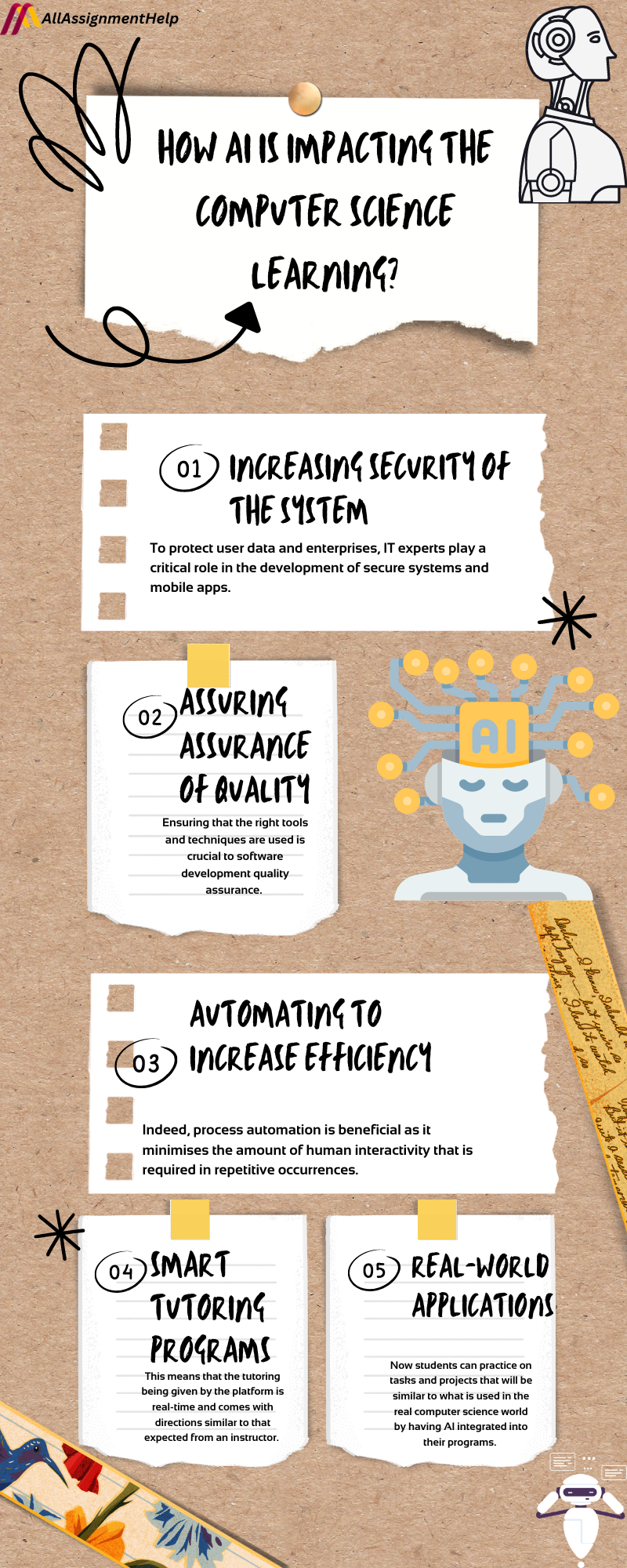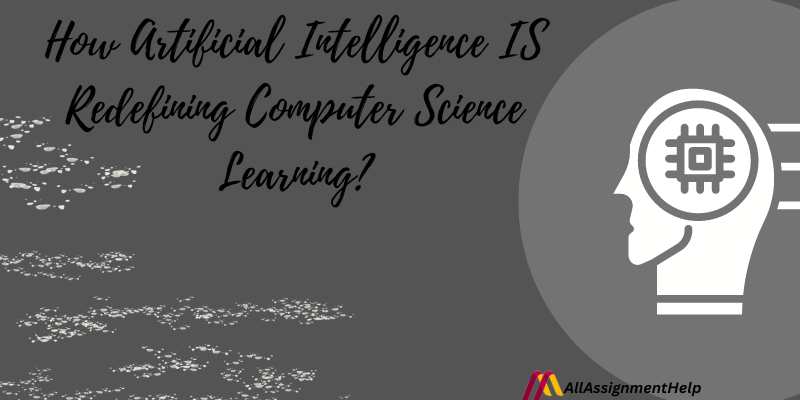Table of Contents
Artificial Intelligence (AI) has gained popularity recently in a number of fields, including education. To be more precise, the use of AI in computer science education has revolutionized ways of teaching. The way we perceive education in the digital age has been profoundly transformed by this revolution. We will examine the various aspects of the AI revolution and know how AI is redefining computer science learning in this blog post which is curated by an expert at allassignmenthelp.
So let’s get started…
What is AI?
Before we talk about this blog’s major topic, let’s discuss what artificial intelligence and machine learning are. Artificial intelligence systems can perform tasks that humans perform with their brains, such as playing games, identifying patterns, and interpreting speech. By examining large volumes of data and learning how to make decisions based on the patterns they discover, individuals acquire the skills necessary to perform these jobs.
Humans can sometimes direct the AI’s learning process by rewarding wise choices and discouraging incorrect ones. However, certain artificial intelligence (AI) systems are also capable of learning on their own without human guidance such as games.
What is Machine Learning?
A machine learning algorithm functions similarly to a smart computer that gains proficiency in a task through data analysis. It solves the problem on its own; it doesn’t require explicit programming. The algorithm forecasts future results by utilizing statistical methods and past data.
There are two primary types of machine learning: unsupervised learning, which uses unlabeled data to search for patterns without knowing the precise answers before and supervised learning, which uses labelled data to know the proper answers.
Now let’s explore the impact of AI and machine learning on computer education..
How AI Is Impacting the Computer Science Learning?
Artificial Intelligence naturally finds its way into learning environments since technology is a part of our daily lives. With the help of artificial intelligence (AI), learning presents outstanding opportunities to improve the performance of students and tailor curriculum to their specific needs.
Artificial Intelligence (AI) has evolved from science fiction to scientific fact in the field of computer science. It has an indisputable effect on computer science learning and profession paths as it gains more and more influence.
The development of AI applications and the analysis of the data these systems generate both heavily rely on computer science. Computer science learning and its applications across a range of industries are greatly impacted by AI and machine learning. Here are some useful facts about these technologies’ impact across several fields:

Increasing Security of the System
Every business owner wants to prevent security breaches from exposing sensitive information. To protect user data and enterprises, IT experts play a critical role in the development of secure systems and mobile apps. The growing incidence of data breaches has made data security crucial.
AI can instantly detect possible security breaches and other risks with its sophisticated search algorithms, providing solutions to stop such issues in the future. Data security has become much more important in the field of computer science.
Assuring Assurance of Quality
Ensuring that the right tools and techniques are used is crucial to software development quality assurance. Developers of software and mobile apps can benefit from the use of AI-based solutions to help them repair faults and errors. Before the product’s release onto the market, problems can be quickly fixed by utilizing AI-based techniques during development and deployment.
Automating to Increase Efficiency
Indeed, process automation is beneficial as it minimises the amount of human interactivity that is required in repetitive occurrences. Companies can build on computer science and deep learning to continue to centralize even more backend processes, which will enable direct people’s engagement in essential corporate functions.
Over time, AI methods improve; thus, enhancing corporate productivity, minimising human mistakes, and improving internal processes. This speeds up the development process enables better refined research and provides useful information for the decision-making process.
Curriculum Development
CS curriculum has been transformed by AI to a very large extent. Traditional computer science learning curriculum included concepts and problem-solving and computational thinking, programming languages, and algorithms. However, the latter with the increased popularity of AI called for new disciplines in the program such as data science, machine learning, and AI ethics. This, however, is a shift that will help prepare students for professions in the world where artificial intelligence is already a reality showing that even the format of education must adapt to the demands of the labour market.
Smart Tutoring Programs
This means that the tutoring being given by the platform is real-time and comes with directions similar to that expected from an instructor. These tools can identify some of the things that a student may not understand as well as give corresponding tasks that can help to ‘fill in the gaps’ thus adding to the ‘fun and excitement’ of learning.
Hosting Server Optimization
Every day millions of user inquiries pass through hosting servers, and this ceaseless hurricane can sometimes slow down the servers or make them passive. It is stated that AI comes to the rescue by solving complicated issues in operational methods, customer assistance, and host servers.
Computer science is arguably one of the best industries for talent cultivation since the need for a skilled workforce is increasing as a result of advanced technology such as the use of artificial intelligence.
Task Automation for Administration
Through applying AI technology into the education system, teachers are relieved from performing monotonous tasks along the lines of scheduling and evaluation, hence they can focus more on actual teaching and guiding the learners. Greater opportunities for developing the ‘voice’ of the classroom are formed, and the bureaucracy decreases.
Learning Platforms Driven by AI
They have been as follows: Students have access to individualised learning opportunities due to online learning platforms that incorporate these AI algorithms. Some of these systems include exams, feedback and information produced in a personalized approach depending on the learners’ mode of learning. Algorithms for artificial intelligence analysis of the user data allow identifying the topics that have the potential to become an issue for students and suggest additional materials that will help understand the material for them.
Improved Learning Experience
Technology brings in characteristics where students get personalized learning, with the program solving their learning needs. This enables the students to progress at a pace that is convenient for them and also enables them to be offered individual attention which in the long run improves a student’s understanding and ability to retain concepts that may challenge in computer sciences.
Real-world Applications
Now students can practice on tasks and projects that will be similar to what is used in the real computer science world by having AI integrated into their learning programs. They get applied experience and acquire problem-solving skills that will benefit them when they join the workforce in artificial intelligence and other related fields.
Conclusion
It is possible to observe certain positives as well as certain negatives of the AI revolution in computer science learning. The possibilities of how students learn and engage with computer science may be revolutionized by the utilization of AI technologies. Thus, along with the opportunities that AI creates in the educational sphere, several issues need to be addressed to ensure the ethical and appropriate use of AI.
The implication of Artificial Intelligence in the field of computer science is wider and it is considered to have many impacts on career progression. The saying “adapt or perish” describes it well: the roles that industry professionals should adapt themselves to are these AI opportunities. Although contemporary AI research targets different challenges associated with the development of new technologies, interdisciplinary cooperation with AI will create numerous professional perspectives from developing new skills to applying AI to new areas.
Further, you can enrol in an online course to learn more about AI. There are numerous online courses available to assist you in strengthening your AI foundations. But don’t be afraid to ask for online assistance from professionals if you run into trouble with your online course and need someone to take your online course for you. They will support you with every issue that arises while you learning online.
FAQs
| Q.1. How does machine learning differ from artificial intelligence? Ans. The term artificial intelligence (AI) describes computer programs that imitate human behaviour to carry out difficult tasks and learn from them. Algorithms trained on data are used in machine learning (ML), a branch of artificial intelligence, to build adaptable models that can handle a variety of challenging tasks. |
| Q.2. How does AI help students get ready for jobs in technology for the future? Ans. AI is incorporated into computer science curricula to expose students to state-of-the-art instruments and technologies, which aids in the development of crucial skills that will be essential in job markets of the future. Their preparation for careers in an AI-driven environment is guaranteed by this exposure. |
| Q.3. What are a few examples of AI tools utilized in computer science courses? Ans. Personalized learning software, AI-powered coding platforms, intelligent tutoring systems, automated grading systems, and virtual labs that mimic actual programming environments are a few examples. |
